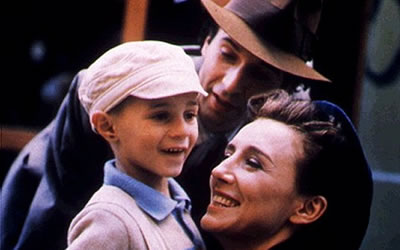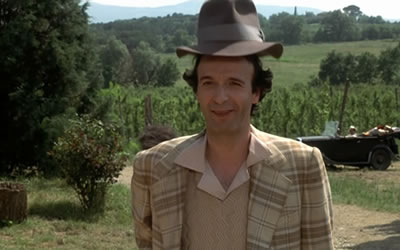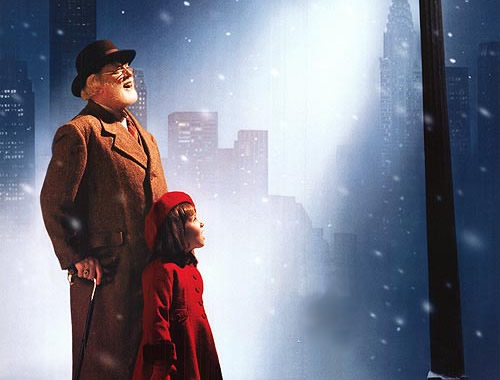
La Vita è bella
It's the late 1930s and Guido (Roberto Benigni), an easy going Jew, arrives in the Tuscan town of Arezzo, where he dreams of opening a book store. Too finance his dream he gains temporary work as a waiter at a local hotel. Whilst working towards his dream, he meets Dora (Nicoletta Braschi), a local school teacher who is engaged to a local Fascist official. This doesn't stop him from wooing her with his romantic gestures and humour. Finally winning her affections, they get married and have a son called Giosué (Giorgio Cantarini). Several years on, and the family are sent to a German-run Concentration Camp where Dora is separated from Guido and their son. Too try and make the harsh surroundings more bearable, Guido convinces his son that they are part of a huge game, where you win points for behaving and doing as you are told, with the winner getting a tank.
Life is Beautiful (La Vita è bella) is an Italian film, which has English subtitles, but before you stop reading dismissing this as something you wouldn't watch, I urge you to read on. The film is set during the Second World War and follows the life of Guido as he creates a life for himself in Arezzo with his new family but unfortunately ends up in a concentration camp, the whole time trying to make life as bearable as possible for his loved ones. It's a beautiful mixture of comedy, romance, drama and war, which although is very humorous it also shows the darkness of the war.

The film is actually split into two halves, the first half which covers the arrival of Guido to the Tuscan town and his romance with Dora, culminating with them having the perfect little life. The second half of the film is the harsher side, where it is set in the brutal concentration camp. Whether this side of the film is historically accurate, I cannot say as I am no expert, but it certainly made the horrors very real.
In the lead role of Guido is Roberto Benigni a very prominent Italian comedian who prior to this was known for the disappointing "The Son of the Pink Panther". Benigni brings a sort of Chaplinesque slapstick to the film which is a major reason why the film is so watch able to all audiences. You actually forget that you are listening to Italian dialogue or reading the subtitles as he tells the story through his actions. If it wasn't for the beautiful soundtrack, you could switch off the volume and still fully understand the movie. Opposite Benigni is his real wife Nicoletta Braschi as Dora who although doesn't provide the humour, is still great as the object of his affections. Finally, there is Giorgio Cantarini as their seriously loveable son, Giosué. Cantarini also featured in Russell Crowe's "Gladiator" as his son. There are plenty of supporting actors and actresses in the film all of which are reasonably well known in their native Italy.
The film is also directed by Roberto Benigni and it is no surprise that he received an Oscar nomination for his direction, plus he also won the Oscar for Best Actor. What he has achieved, is to keep the film simple enough so that it will appeal to a universal audience, whilst also giving it enough depth to keep you entertained. Also, the sound track really helps to set the mood in every scene, from the light hearted string pieces during the first half of the film, too the much more sinister and heavy pieces in the concentration camp. This is one of the very few soundtracks to a film that I have ever bothered buying, purely because it is so beautiful.
This is one of my favourite films, purely because it's the performances which tell the story rather than the dialogue. Benigni is a brilliant comic, and at times this film harked back to days of Chaplin, with side splitting slapstick comedy. Although the film does have the dark undertones of the Second World War, it treats it in a respectful but easy to watch manner. I know that being a foreign language film, it will not appeal to a lot of people, but I seriously recommend you watch it as it will open your eyes to a better quality of film making.





















